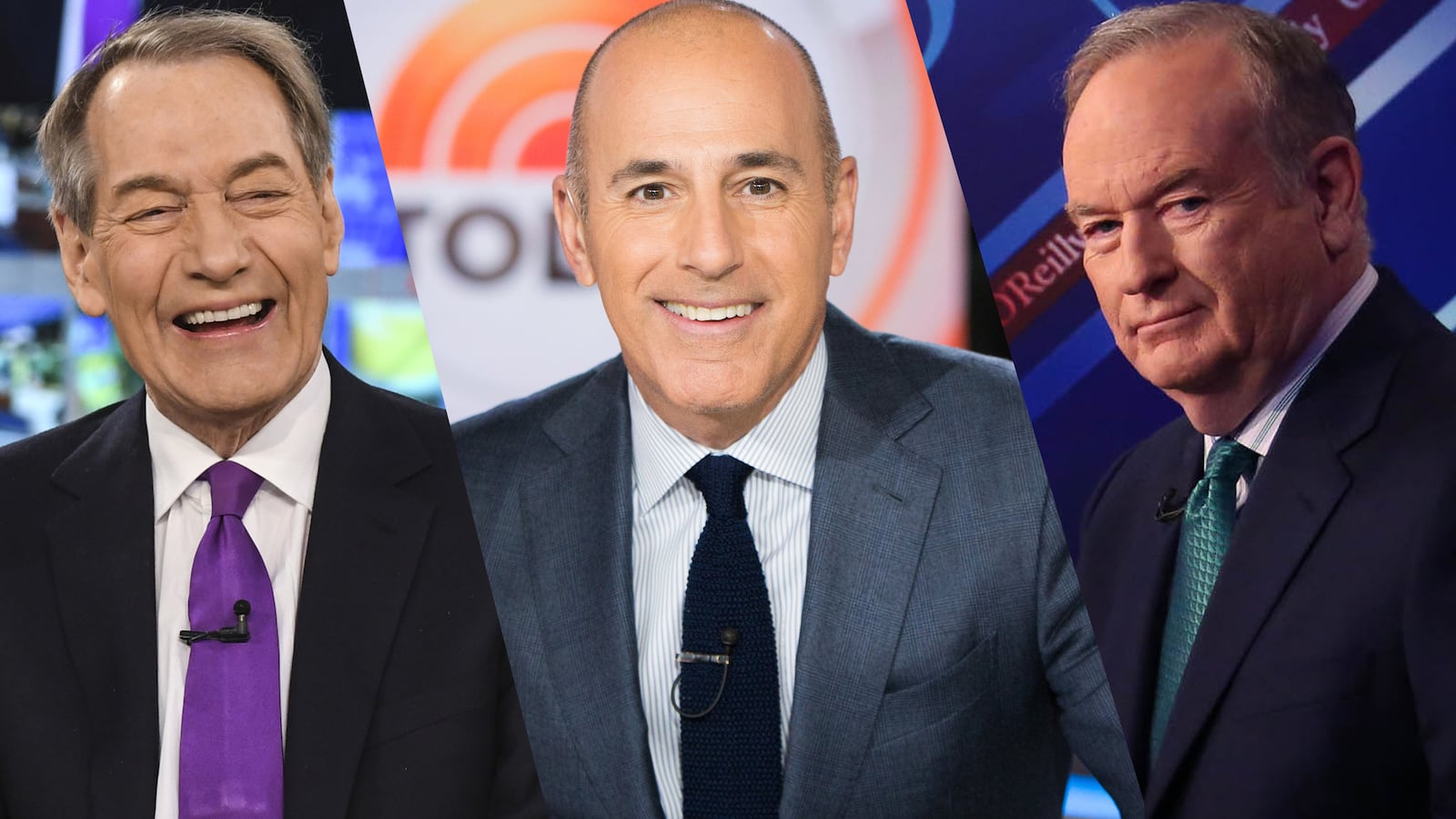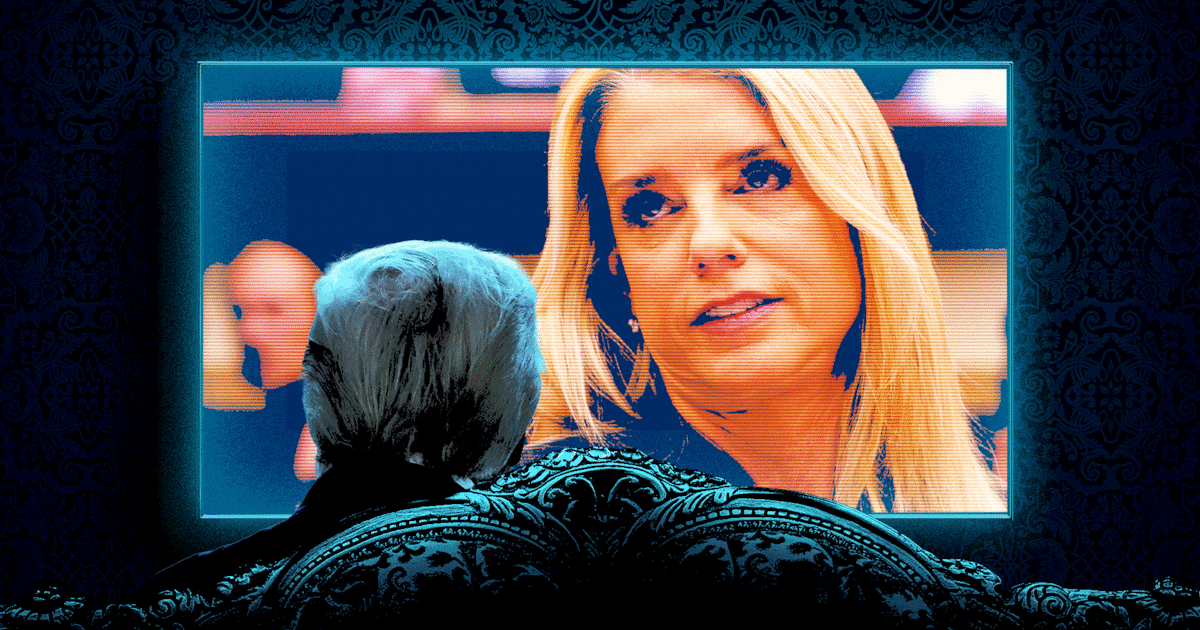The heyday of alpha anchor appears to be finished, along with the cherished belief of television executives that it’s necessary to cater to coddled stars in the service of ratings and revenue.
The waning days of 2017 feature a growing number of industry insiders who say good riddance to overpaid rubbish.
“The emperor has no clothes,” network news analyst Andrew Tyndall told The Daily Beast. He was not referring to Charlie Rose parading naked in front of young female underlings, but instead to the thorough debunking of a TV truism: “It’s just not true that the reason why people watch television is to watch celebrities, and the only way you get celebrities is by paying them disproportionate amounts of money over what they’re worth,” Tyndall said.
Former CBS News president Andrew Heyward largely agreed, predicting that the recent firings of Rose and other high-profile anchors, coupled with continued decent ratings for the programs and networks they left, might finally imprint a long-unheeded lesson on the brains of broadcast and cable executives; the new reality demands a more hard-headed calculus in 2018.
“Just to look at it from a crass business perspective, it’s early to assess what the ratings impact will be, but I suspect that the impact of their departures, from a strict point of view of ratings and revenue, is going to be much less than people think,” said Heyward, a visiting scholar at the Massachusetts Institute of Technology’s Media Lab. “Obviously, anybody is better off without having a sexual predator on the team.”
In the most important respect, the career implosions of Bill O’Reilly, Charlie Rose, and Matt Lauer (not to mention Fox News host Eric Bolling, MSNBC pundit Mark Halperin, CNN producer Teddy Davis, and a list of offenders yet to be named) signal an overdue recognition that workplace sexual misconduct can no longer be ignored—or, for that matter, tolerated and enabled—in a business notable for its history of hard-wired sexism and misogyny.
But the abrupt sackings of ridiculously well-compensated franchise players—who were supposedly essential to the financial success of their respective programs and media outlets—also demonstrate a more prosaic truth: They just didn’t matter as much as everyone imagined.
Viewership of the Today show minus Lauer, of CBS This Morning minus Rose, and especially of the top-rated Fox News Channel minus O’Reilly, has not measurably suffered in recent weeks—begging an uncomfortable question: Then why were they deferred to so regularly and paid so much in the first place (a reported $25 million annually for Lauer and O’Reilly, and a lesser reported $8 million for Rose, who also contributed to 60 Minutes and made money from his eponymous, self-owned PBS interview show)?
In a related vein, industry insiders continue to question NBC News Chairman Andy Lack’s decision to pay a reported $23 million a year to lure Megyn Kelly from Fox News, especially now that the third hour of the NBC’s 65-year-old morning show, Megyn Kelly Today, has been underperforming at 9 a.m. since its late-September launch.
“The system was not only encouraged by the anchors and their agents,” Tyndall said, “but also by the executives—an entire industry that was terribly self-reinforcing is now being exposed as a complete waste of the media’s wealth at a time when budgets are being cut in other directions that are much more harmful. Megyn probably got the last one in before the whole system collapses like a house of cards.”
While Kelly has received critical plaudits, and a ratings boost, for spotlighting the “Me Too” campaign and women who came on her show in recent weeks to detail their experiences of being sexually harassed—and worse—by O’Reilly, Lauer, Harvey Weinstein, and other powerful accused male predators, the benefits might be transitory.
Former CBS News executive Marcy McGinnis suggested that Kelly in the morning “is like a fish out of water.”
After Kelly’s prime-time success as an edgy, conservative-sounding star at Fox News, with its viewership dominated by aging men, “they hired her at NBC as a happy-talk anchor at 9 a.m.—so why would the audience that watched her on Fox tune in to watch her doing touchy-feely pieces and pretending to be like every mom in America at 9 a.m.? I don’t understand why Andy Lack would make that decision.”
Heyward, meanwhile, cited another driving force in the demise of the alpha anchor—the drastically shrunken audience share of the broadcast networks.
“There’s still some magic to being on TV, but compared to what it was 25 years ago, it’s also very hard,” he said. “There are so many sources of information, so much fragmentation in the market, in technological change, the rise of social media, that the trend is to bring the unassailable, omniscient, all-powerful anchor off the pedestal. And that’s a change that is overdue.”
It has been four decades since CBS Evening News anchor Walter Cronkite was universally heralded as “The Most Trusted Man in America.”
“There is no iconic Walter Cronkite figure anymore,” said McGinnis, citing the dominant network news anchor of the 1960s and 1970s until he yielded the throne to Dan Rather in 1981.
“There is no ‘Oh my God, we have to tune in to watch Walter!’ Nobody’s changing the channel because somebody’s gone,” added McGinnis, who served as Heyward’s second-in-command during his nine-year tenure running the news division.
“It’s a little bit old fashioned to say this, but there are so many people on TV, so many personalities, that there’s not one personality who can cause viewers to say, ‘I’m not watching this because you let him go.’”
“The days when you had Cronkite and Dan Rather and Peter Jennings—those giants don’t walk the earth anymore,” Heyward said, “and there has been a secular decline in the nightly news shows and a de-deification of the anchor for the next generation.
“Nobody is going to be in awe of somebody just because he or she is on TV. It’s much more of a peer-to-peer relationship between us and the journalists who serve us. And respect will be linked to accountability and enterprise instead of the trappings of anchor-dom.”
Ironically, Cronkite—who was a colossus at a time when networks ruled the airwaves, in contrast to the Lilliputians of today’s fractured media ecosystem—was paid less than a million dollars by CBS at height of his influence and popularity.
Cronkite, who died in 2009 at age 92, was understandably jealous in 2006 when Katie Couric took over his old job for a reported $15 million a year.
“Walter just missed the era of the highly paid anchor and he resented that,” said former CBS News executive Betsy West, who had also worked under the legendary Roone Arledge at ABC News. “I think Walter was not happy because he did not benefit when Roone came in and started poaching talent from other networks and raised the bar very quickly in the mid to late 1970s,” when Cronkite was reaching CBS’ mandatory retirement age of 65.
“I think Roone recognized that talent should be rewarded, and he certainly had set in motion an arms race of increased salaries,” West said. “I remember when Barbara Walters was recruited [from NBC in 1976 for an ill-conceived co-anchoring job with the snappish, sexist Harry Reasoner] and people were shocked that she was going to make a million dollars.
“But Roone came out of the world of sports and he understood the value of a quarterback, of a star player, and he set in motion the star system that led to excesses, and of people tolerating the bad behavior of some of the stars who were in power.”
Tyndall said the late Arledge’s star-making machine might have been powerful in the 1980s and 1990s before the advent of the internet and the transformation of the media landscape, but recent evidence suggests it is no longer functioning effectively.
The Arledge way “was a security blanket,” Tyndall said. “The way these decisions used to be made is executives would do their research and see who got the highest Q ratings, and use that to justify it.” Despite what Tyndall described as “a holdover from Roone Arledge,” celebrity and star power have become increasingly irrelevant, he argued.
“The Katie Couric experiment failed. NBC Nightly News’ ratings didn’t decline when Lester Holt replaced Brian Williams, and the same happened with ABC World News Tonight when David Muir replaced Diane Sawyer.”
Megyn Kelly, meanwhile, appears to appreciate the uncertainty of her position in a precarious new world in which the alpha anchor no longer exists.
During a segment last Thursday morning on unusual Christmas gifts, she found herself confronting a Williams Sonoma pickle maker.
“Listen this is my backup plan—if my TV career dies a slow, painful death, I’m gonna start pickling and canning things in Vermont,” she said.
A joke, no doubt.






